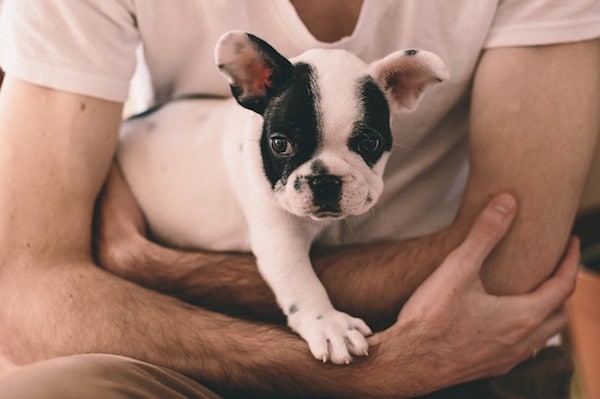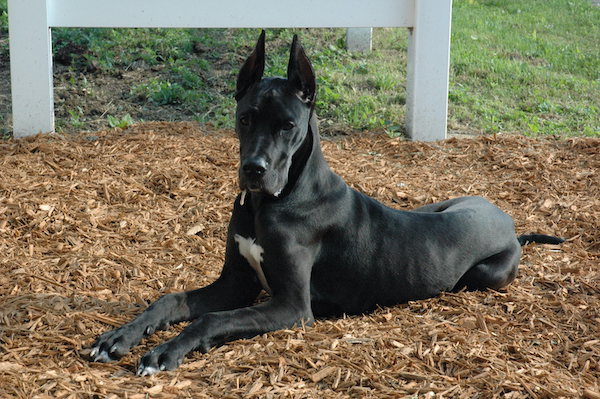French Bulldogs, affectionately referred to as Frenchies, are a wonderful dog breed. If you’ve just brought home your first Frenchie or are preparing to, it is important to learn a little more about the breed and their specific needs to help ensure you provide your new pup with the care they need.

French Bulldogs are smart and playful pups. Both males and females grow to be about 11 to 13 inches tall and generally weigh under 28 pounds. Frenchies are very smart and playful dogs that make an excellent family dog. There is a lot to love about this special breed, but they also have some unique needs that you should be aware of. Below you’ll find a list of eight tips to help you take care of your first French Bulldog.
Grooming and Cleaning
Frenchies have some very specific needs when it comes to grooming them and keeping them clean. Their heads have lots of folds where dust, dirt, and other debris can become trapped. These fold needs to be regularly cleaned to prevent an infection from occurring. A Frenchie’s ears also need to be cleaned regularly since they are so open and may take in dirt, grass, dust, and other debris from their environment. Talk to your vet about getting an ear ointment to use for cleaning their ears about once every week. Another part of a French Bulldog’s body that can collect dirt is the tail pocket. Clean this area each day to prevent infections.
While Frenchies don’t shed too much, they should still be regularly groomed. Using a grooming glove can make reaching all the parts of their body a bit easier. French Bulldogs should also be bathed regularly. Since their skin is sensitive and the breed is prone to allergies, choose a gentle and fragrance-free shampoo to use when bathing your Frenchie.
Finally, don’t forget about your French Bulldog’s teeth and nails. They are more likely to suffer from dental disease than some other dog breeds, so you’ll want to be sure to brush their teeth at least a few times every week. A Frenchie’s nails should also be trimmed regularly; if they get too long, walking may become painful.
Preventing Obesity
Talk with your vet to choose the best dog food to meet your Frenchie’s specific needs. French Bulldogs need to eat a relatively high-calorie and high-protein diet. However, this breed is also susceptible to obesity, so you want to avoid over-feeding. It is generally recommended to portion their daily allotment of food out into three or four smaller meals rather than one or two large meals.
Another key in preventing French Bulldogs from becoming obese is making sure they get plenty of exercise. This breed needs about an hour of exercise each day. Try taking your Frenchie for a few shorter walks throughout the day and avoid overexercising them on warmer days so they don’t overheat.
Training Your Puppy
It is a good idea to begin training and socializing your new French Bulldog pretty much as soon as you bring them home. When Frenchies are exposed to a variety of situations and different people and pets from a younger age, it helps ensure that they’ll be better adjusted as an adult.
French Bulldogs may be a bit stubborn, but overall, they aim to please their owners which can make training them easier than some other breeds. However, if you wait too long to begin training your French Bulldog, they will likely be more stubborn and difficult to train. Frenchies tend to do best with positive training techniques and can be highly motivated by food.
Keeping Your Frenchie Healthy

As with all dog breeds, it is important to schedule regular health checkups and vaccinations with a veterinarian. There are a number of health concerns that may affect a French Bulldog. Some potential health issues that Frenchies may face include dental disease, obesity, viral and bacterial infections, spinal deformities, eye problems, hip or elbow dysplasia, allergies, respiratory distress syndrome, degenerative myelopathy, and skin infections. Talk with your veterinarian to learn more about each of these potential concerns and what signs and symptoms you should be on the lookout for.
Take Steps to Avoid Separation Anxiety
Frenchies are more likely to suffer from separation anxiety than many other dog breeds. Dogs with separation anxiety have a hard time being left alone and away from their owners. They are more likely to bark when left alone and may become destructive. When alone, some Frenchies with separation anxiety may chew things around the house, urinate or defecate indoors, or try to escape. While it may seem like your dog is just being naughty and getting into trouble, these behaviors are more likely a sign that they are anxious or distressed.
Since Frenchies are so prone to separation anxiety, they are not good dogs for people who are away from home for a good portion of the day. They do best in homes where someone is able to stay with them for the majority of the day. A French Bulldog may also be a good choice if you work in a pet-friendly office where your dog will be able to accompany you to work.
Keeping Your Frenchie Cool
It is quite easy for a French Bulldog to overheat. Their nostrils are shorter than many other dog breeds, which means they aren’t able to inhale sufficient amounts of air if they get hot. Frenchies do best in environments that are around 75 degrees. If your dog is starting to overheat and you notice that they are panting or drooling, you should act quickly to cool them down. Try splashing some cool water on their fur. Keeping your French Bulldog’s water bowl full of clean and fresh water can help prevent dehydration and overheating too.
Choosing a Harness
French Bulldogs, especially puppies, may get a neck injury from using a standard collar. This is because the puppies are still learning how to be obedient and walk with a leash and may pull and injure their necks. Choose a soft and comfortable harness that will prevent your dog from injuring its neck should they pull when you take them out for a walk.
Playing with Your Frenchie
Finally, don’t forget to have fun with your new pup. Playing with your dog will not only be fun for both of you, but it will provide them with some much-needed attention and activity. When you purchase toys, look for some tug toys or balls that you can play with together, but also select some chew toys or teethers that he’ll be able to enjoy on his own.
Frenchies can make a wonderful addition to any home. We hope the tips above will help you offer your French Bulldog the best care possible to help him or her stay happy and healthy!




